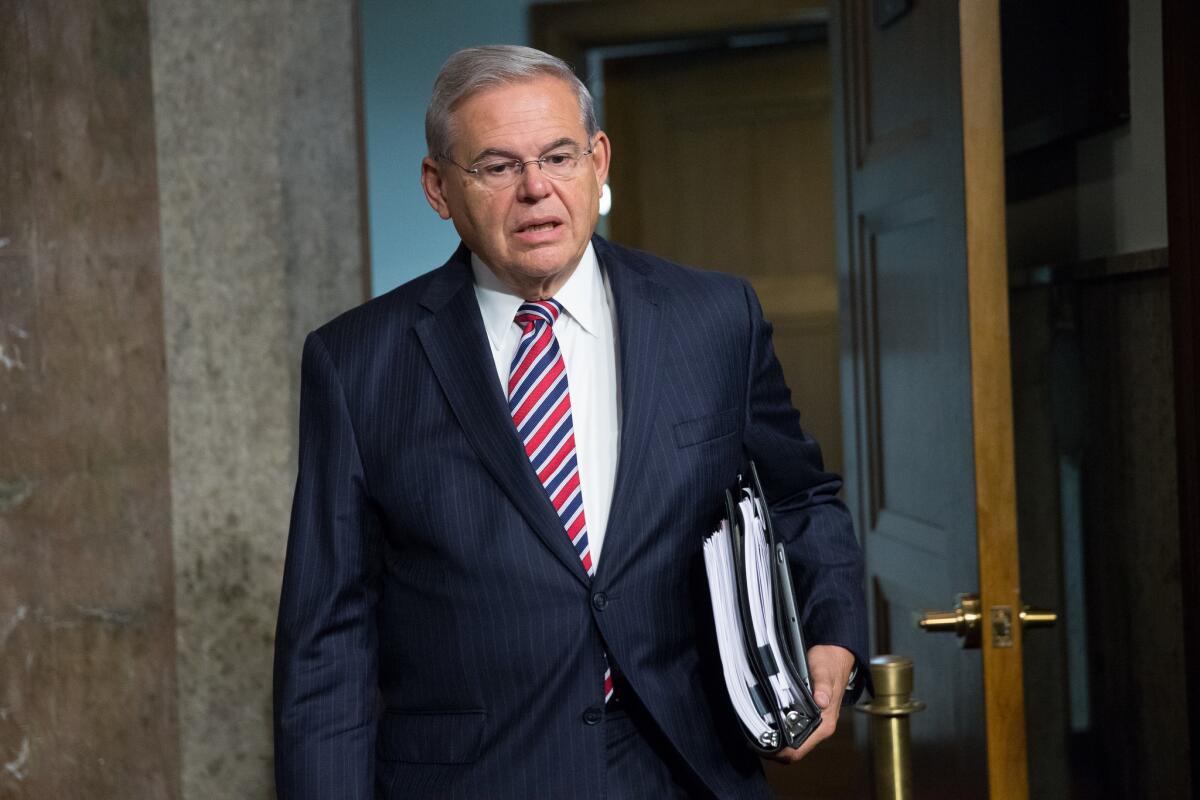A second Democrat, Sen. Robert Menendez, opposes Iran deal

Sen. Bob Menendez (D-N.J.) says that he will vote against the nuclear agreement with Iran.
- Share via
Reporting from Washington — New Jersey Sen. Robert Menendez, a key Democrat who has been highly skeptical of the landmark nuclear deal reached last month between Iran and six world powers led by the United States, announced Tuesday that he would vote to oppose the agreement.
Menendez’s opposition was not a surprise given his criticism of the deal. It comes amid a fierce lobbying fight before next month’s expected vote in Congress.
So far, President Obama appears to have enough support to uphold the deal, which would curb Iran’s nuclear activities in exchange for the easing of oil and economic sanctions. Even though Republicans control Congress and almost uniformly oppose the agreement, they are unlikely to sway enough Democrats to form the two-thirds supermajority needed for a veto override.
Menendez took aim not only at perceived shortcomings of the deal, but also at Obama’s characterization of opponents as military hawks like those who backed the Iraq war launched in 2003. The agreement announced in July came after almost two years of negotiations between the six world powers — Britain, China, France, Germany, Russia and the United States — and Iran.
“The agreement that has been reached failed to achieve the one thing it set out to achieve: It failed to stop Iran from becoming a nuclear weapons state at a time of its choosing,” Menendez said, speaking at Seton Hall University’s School of Diplomacy and International Relations.
“This deal is based on ‘hope,’” said Menendez, a Cuban American who has often been at odds with the administration on foreign policy. “A hope that things may be different in Iran in 10 to 15 years. Maybe Iran will desist from its nuclear ambitions. Maybe they’ll stop exporting and supporting terrorism.... Or maybe they won’t.”
Menendez noted that unlike the administration’s chief backers of the deal, Secretary of State John F. Kerry and Vice President Joe Biden, he voted against the war in Iraq, which was an unpopular position at the time.
Menendez, a former chairman of the Foreign Relations Committee, is the second Democratic senator to publicly oppose the deal. Sen. Charles E. Schumer of New York announced his opposition this month.
Republicans need to win the votes of four more Democrats to pass a resolution of disapproval in the Senate, assuming all Republicans oppose the deal. Though that would be a symbolic blow, Obama still would be able to veto the resolution.
Other Democratic senators who have announced their positions on the deal have lined up behind Obama. As of Tuesday, 21 senators who caucus with the Democrats have announced their support, including Dianne Feinstein and Barbara Boxer of California.
No Republicans have announced their support for the deal. In a setback to White House efforts to secure at least some bipartisan backing, Sen. Jeff Flake (R-Ariz.), who had been heavily courted by the administration and was seen as a possible supporter, said over the weekend that he would oppose the deal.
Both Menendez and Schumer represent areas with sizable Jewish populations. Though Jewish Americans appear divided over the merits of the deal, Israeli Prime Minister Benjamin Netanyahu has called it a historic mistake. In the House, most of the Democratic opponents are under similar home-state pressures.
Some American defense hawks also are lobbying hard against the agreement, which would lift international sanctions against Iran in exchange for limits on the country’s nuclear ambitions.
Neither Menendez nor Schumer, who is poised to become the party’s next Senate leader, appear to be attempting to sway their colleagues to oppose the deal.
Many lawmakers are skeptical that Iran will wind down its nuclear ambitions, despite promised access to international inspections.
Menendez stepped down as the top Democrat on the Foreign Relations Committee this year after being indicted on federal corruption charges. He denies any wrongdoing.
The New Jersey senator has suggested that the administration could achieve a better deal through continued negotiations.
The Obama administration says that the proposed agreement is one of the strongest of its kind and that if Congress rejects it, the only alternative to block Iran from obtaining a nuclear weapon will be military action.
Congress faces a Sept. 17 deadline to act, and debate is expected to begin after Labor Day, when lawmakers return to Washington from recess.
For the latest from Congress and the 2016 campaign, follow @LisaMascaro
More to Read
Get the L.A. Times Politics newsletter
Deeply reported insights into legislation, politics and policy from Sacramento, Washington and beyond. In your inbox twice per week.
You may occasionally receive promotional content from the Los Angeles Times.











